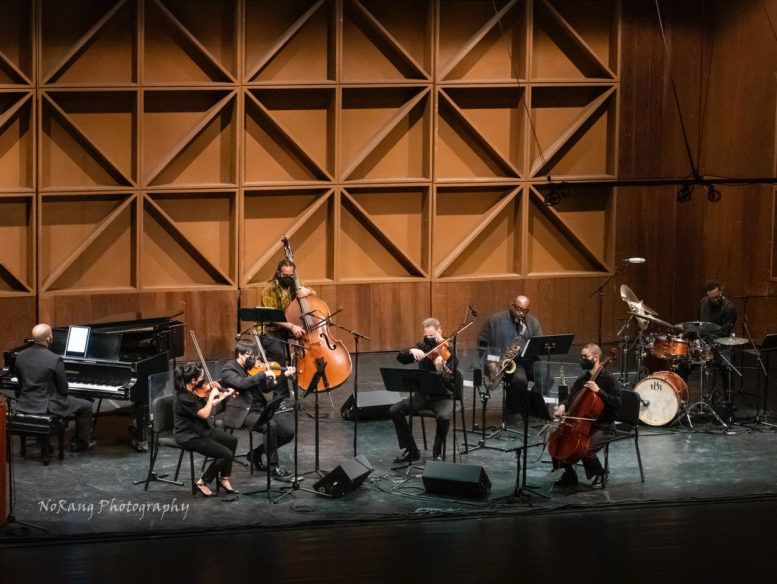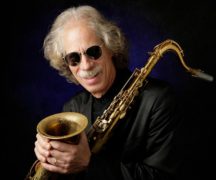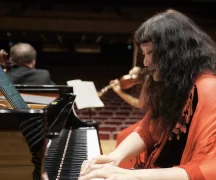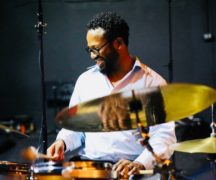By DAVID DUPONT
BG Independent News
When Mark Lomax, II was studying music at Ohio State where he earned three degrees culminating in a doctorate, he was often asked whether he was going to be a “jazzer” or a “legit” musician and write classical music.
He refused to make a choice, he told the audience in Bowling Green State University’s Kobacker Hall Wednesday evening.
There are three types of musicians, he explained in the question-and-answer session. There are “class A” musicians who play Western classical music “true to the form.”
Then there are “class B” musicians who play Black improvised music “true to form.”
Lomax explained: “If you played funk you didn’t care about Bach, and if you play Bach you don’t care about funk.”
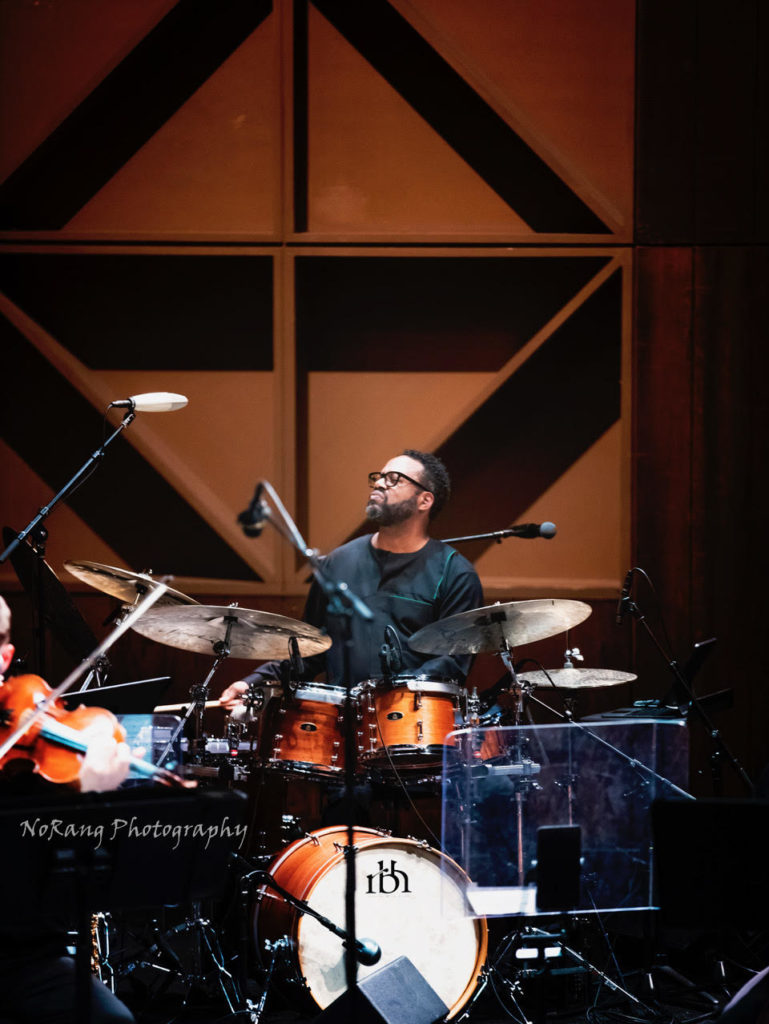
He embarked on the third way, a “class C” musician, “the one who digs all of that and figures out how to create something new from everything.” To do that “you have to know authentically” each style in order to bring them together.
Lomax was at BGSU as the Beyond the Dream keynote speaker and as part of the Hansen Musical Arts Series.
[Read related story: Drummer & composer Mark Lomax II brings his musical vision of a world shaped by traditional African values to BGSU]
Lomax demonstrated just how these reputedly divergent styles could merge into a powerful musical statement. Lomax blended his jazz quartet with a string quartet of BGSU faculty members and graduate students to present a suite of music from his eight-and-a-half-hour long “400: An Afrikan Epic.”
The mammoth work commemorates the arrival in 1619 of about 20 enslaved Africans in Virginia. The event is considered the start of chattel slavery in the United States. From it a new people emerged and the world was changed. The implications continue to resonate through the generations.
Lomax composed the 12-disc epic “because I wanted to build something based on a very human story that hopefully calls humanity into a conversation as opposed to calling them out,” he said. “I’m charging us as human beings to dig down and reach into our soul and call on the power that Dr. King called the soul force to create the next 400 years, that allows humanity to be healthy and whole … so it works for all of us, not just here but all over the world. African Americans are a key to this success .”
These themes are embedded into the music.
The suite opened up with Lomax deep percussive rumble, establishing the drum as “the voice” of the piece before the string quartet entered with a majestic theme.
Lomax used his drum kit to shape the music as it unfolded without break over the course of an hour. He guided the ensemble through the form and punctuated its phrases. The suite moved from the African village to a slave ship evoked by the creaking sounds from Dean Hulett’s bass. The hope of enslaved people came through in an eloquent and rousing gospel solo by pianist William Menefield, which elicited a burst of applause from the audience. Throughout the quartet with Edwin Bayard’s saxophones out front performed with an ebullience that evoked the ecstatic spirituality of John Coltrane.
The string quartet ( Caroline Chin and Min-Han Tsai, violins, Matthew Daline, viola, and Otavio Manzano Kavakama, cello) had its lyrical moments, but Lomax employed it for percussive accents and leaping phrases in counterpoint to the quartet.
The “400” suite ended back with Lomax tapping softer and softer and softer with his mallets until all that remained was silence, and then an explosion of applause
In his introductory remarks, Dean William Mathis, of the College of Musical Arts, thanked Lomax for his “inspirational” work with students during his two-day residency.
“Music and the arts provide experiences in our lives that we understand on intellectual and emotional and spiritual levels. They communicate in ways that language cannot,” he said. “The arts inspire us. They teach us about humanity and bring us together like this evening.”
BGSU President Rodney Rogers in his introductory remarks acknowledged these were polarized times. “We must continue to believe our communities are stronger when we work together, we listen to each other, we learn from each other.”
This is the way problems, large and small, are solved, bringing progress.
“In the end we will always have more in common than what divides us,” Rogers continued. “Where our differences meet, we are better for that. In fact, that is the process that shapes each of us as we learn, develop, and grow.”
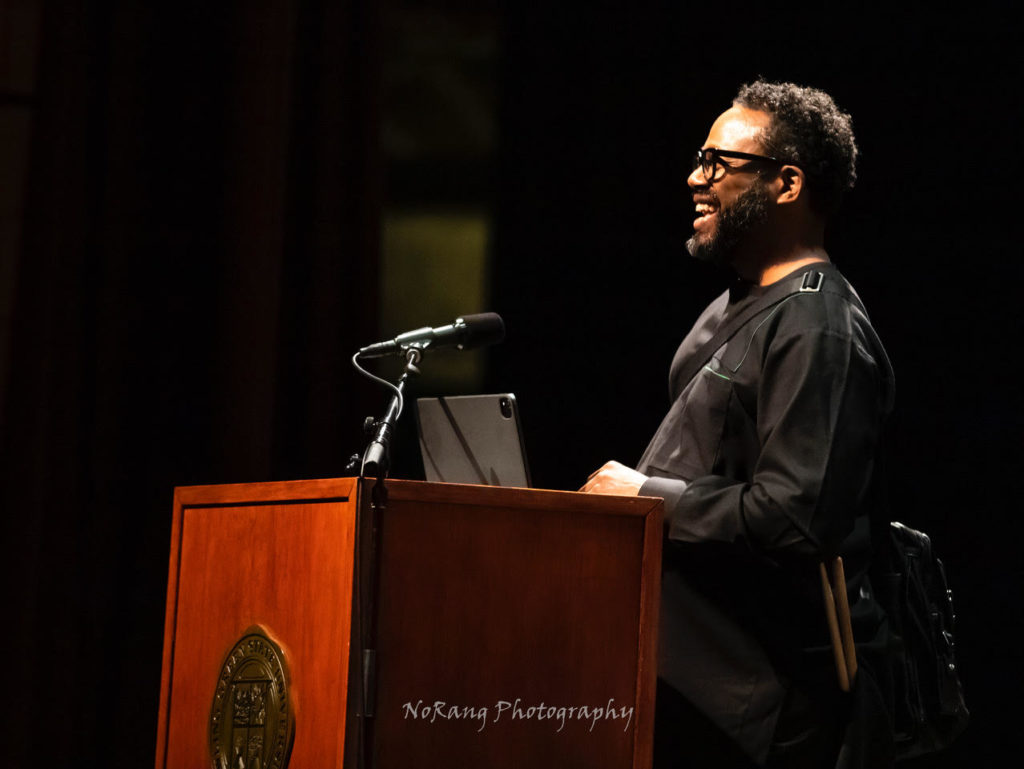
Lomax was asked by a student how he dealt with “the haters” who questioned his ambitions. Lomax said he had to learn to deal with such responses because he was “a free Black man in America.”
The haters, he said, only inspire him to continue his work.
African Americans’ humanity has always been questioned and challenged. “That’s why we’re still having this conversation,” Lomax said. “That’s why we have Black Lives Matter. That’s why we celebrate Dr. King. That’s why this fight for voting rights is happening right now. For us, it’s not a right yet, it’s a privilege. If it was a right, we wouldn’t be having this argument in Congress.”
As for his role, he said, “me, I’m a just drummer. I write some good music every now and then. I’ve been charged to bring the music to people like you and say: ‘hey, what are you going to do to change the world?’”

